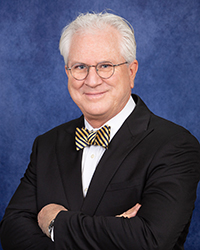Finding His Calling

By Matt Jacob
Patrick Chapin’s students know him as an affable guy with an abundance of legal experience, particularly in the realm of alternative dispute resolution (ADR). Those students also know Chapin as someone who believes in the concept of “learning by doing,” a philosophy that guides his twice-a-week ADR in Employment Law course at the UNLV William S. Boyd School of Law.
Here’s what those students don’t know: Chapin mapped out his career plan at a young age, and becoming a law professor was nowhere to be found on that map. Heck, neither was becoming a lawyer.
“I was very much into science—specifically, biology and chemistry,” Chapin says. “I was absolutely going to medical school.”
Sure enough, after accepting a full-ride golf scholarship to Louisiana Tech University in the late 1970s, the Midwest native enrolled as a biology/chemistry major. But about halfway through his studies, Chapin began to question if he was heading down the right path. Steering that uncertainty: an old high school course.
“I took a mandatory government class during my senior year, and the teacher presented the material in a fun and interesting way that gave me a different insight,” Chapin says. “I remembered thinking, ‘Boy, I really liked that government class.’ I soon came to realize that with my personality and skillset, I was probably going to be a better lawyer than a doctor.”
So Chapin relinquished his athletic scholarship, transferred to Purdue University where he earned an English degree, then took off for law school. In 1993, he made his way to Southern Nevada and began working as a sole practitioner in civil litigation, eventually with an emphasis in employment law.
As the years passed, though, Chapin found himself resolving the majority of his cases not in a courtroom but at a bargaining table. Realizing this wasn’t a temporary trend, Chapin decided to seek the skills and knowledge required to become an ADR practitioner.
That led him first to the Straus Institute for Dispute Resolution at the Pepperdine School of Law in Southern California, and then to the Saltman Center for Conflict Resolution. Since receiving advanced mediation training at both institutions, Chapin has served as an arbitrator (neutral) and/or mediator for more than 350 cases in the past seven years.
During that time, Chapin’s connection to the UNLV Boyd School of Law has strengthened. He has served as a mediation coach, guest speaker, panelist, and judge for various law school competitions. And three years ago, he took on the role of adjunct professor after working with Saltman Center founding director/Michael and Sonja Saltman Professor of Law Jean Sternlight, and Workplace Law Program co-directors/Boyd Law professors Ann McGinley and Ruben Garcia to develop the ADR in Employment Law course.
Adding adjunct professor to his already well-rounded résumé wasn’t something Chapin planned—although he acknowledges it’s a natural fit, given his penchant for mentoring and taking charge in given situations.
“For whatever reason, I’ve always seemed to be the one selected or appointed to be the leader [of projects] or the chairperson of committees or subcommittees,” he says. “When I was younger, people jokingly called me ‘professor’ and often told me, ‘You missed your calling; you should’ve been a professor!’”
As the title of his class suggests, Chapin provides students insights into how ADR principles apply to employment law, and which methods (mediation, arbitration, negotiation, etc.) should be used at different times.
Another thing Chapin provides: an opportunity for one student to pay some bills. Last year, he funded the Chapin Book Award, an annual $1,000 gift that’s awarded to one student who demonstrates an interest in (and aptitude for) dispute resolution. This year, he created a second Chapin Book Award for students in the Workplace Law Program.
“I remember one time as a science student, I received a book award for $100 and I thought it was the world,” says Chapin, explaining his motivation for establishing the awards. “So these book awards are just my small way of giving back and helping a high-achieving student who is passionate about conflict resolution.”